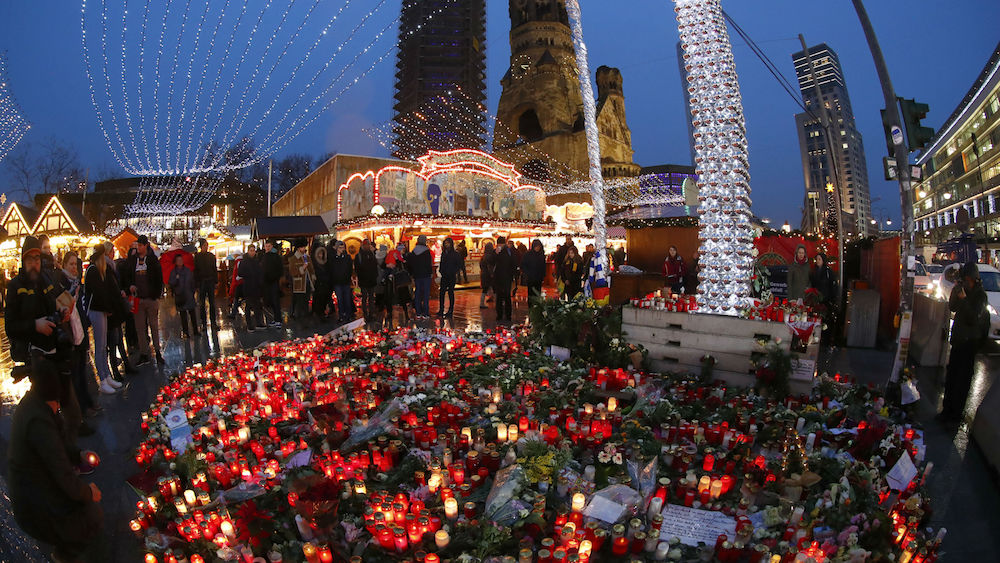Following terrorist attacks in Paris, Nice, and Berlin, the two governments have revisited how they keep their populations safe. Despite facing different challenges – and limitations imposed by different histories – each could learn a thing or two from the other.
Many French had a feeling of déjà vu when a truck barreled into a Berlin Christmas market two weeks ago, killing 12 – tactically, it seemed to echo an attack in Nice this past summer in which a truck drove into a Bastille Day celebration. In both cases, the so-called Islamic State (IS) claimed responsibility, though in Nice the French found that the attacker was only inspired by the terrorist network (and mocked IS on Twitter for claiming responsibility). Now each country is facing an electorate increasingly concerned by IS-related attacks, and enemies who seek to take advantage of refugee flows and porous borders.
Despite these similarities, the French and German responses stand in stark contrast. France, long familiar with terrorism, has adopted a heavy-handed approach, while Germany has opted for more restraint. Now each country is discovering the disadvantages of its strategy: France is wrestling with the ineffectiveness of expansive state powers, and Germany with the ineffectiveness of limited ones.
France: More is Less
“Should France remain in Algeria? If you answer ‘yes,’ you must accept all the necessary consequences.” The French colonel’s infamous defense of brutal counter-terrorism tactics in the 1965 film classic The Battle of Algiers is indicative of a French policy that has remained controversial for its relegation of civil liberties to second priority status. True to form, following the November 2015 attacks France enacted a state of emergency that expands police power and has come under fire for its civil liberties abuses. It remains in effect despite initially being limited to three months.
Bellicose language has accompanied France’s tough stance. “France is at war,” declared President François Hollande after the Paris attacks, launching airstrikes on IS. Presidential hopefuls from across the political spectrum concur, from far-right Marine Le Pen to center-left Manuel Valls. Republican candidate François Fillon asserts, “It’s no longer about terrorism… we are at war.”
But for all its intensity, the response inspires little confidence. A French parliamentary report found the state of emergency to be largely ineffective, and after Nice 67 percent of those polled said they didn’t trust the government to effectively fight terrorism. At a memorial, a bristling crowd shouted “murderer!” at Valls, then prime minister. Hollande was criticized for seeming unable to come up with an approach beyond re-extending the state of emergency. Some have suggested more draconian measures, but with three major attacks in 18 months amid already broad police powers, it is unlikely this would satisfy demands for better protection.
Germany: Less is More
Germany’s approach is more subdued. Compared to France, its history with terrorism is less extensive and its IS-linked attacks both more recent and less severe. Meanwhile, the specter of its totalitarian past impels it to maintain decentralized government powers and minimal surveillance. A reluctant military power, it has refrained from conducting counter-IS airstrikes.
In response to recent attacks, the government has delicately upped its counter-terrorism capabilities. A nine-point plan introduced this summer extends some state powers, but is weighted toward broadening the counter-terrorism toolkit. Last week, the government passed a law allowing more public video surveillance, but softened the blow by making installation voluntary, not mandatory.
Germany’s rhetoric is also more tempered. Merkel has described the terrorist threat as a “war” only sparingly and with utmost caution. In the days following the Christmas market attack she avoided the term, instead stressing the “need to defend the values of democracy and rule of law on our side.” She made a point of being “extremely proud of how calm people have stayed.” The comment was consistent with Merkel’s cool-headed leadership style, but also reflected her intention to stand her ground against parties like the populist, anti-immigration Alternative für Deutschland (AfD), which advocate for a forceful government clampdown.
Promoting Sound Solutions
As Germany and France seek to improve counter-terrorism, they could stand to learn from one another. Germany cannot and would not want to adopt the French model, but as it cautiously treads forward, it can look to the successes and drawbacks of its neighbor’s experience. France, on the other hand, can learn from Germany’s track record in operating within legal restrictions as it pursues new approaches. Counter-radicalization programs are one option, particularly for a country that struggles with integrating marginalized populations. France has begun, with little success, to implement these. Germany, however, has been doing this since the 1980s, in programs aimed first at neo-Nazis and later adapted to new threats.
The two countries share the need for better coordination domestically and within Europe. The Berlin attacker, Anis Amri, was a known threat, but slipped surveillance when crossing state jurisdictions. Similar failures led a French Parliamentary inquiry to call for the establishment of a national counter-terrorism agency. It also reiterated EU ministers’ calls to respond with greater European cooperation – Amri’s escape to Italy, via France, underscores persistent gaps. Some could be filled by taking steps to repair logistical shortcomings rather than wading into a sovereignty battle, such as ensuring standardized entry of information into the Schengen database, which was found wanting in the Paris attacks.
France and Germany have always had their differences, but they can both benefit by promoting sound solutions within the union and discouraging knee-jerk reactions at home that are more cosmetic than productive. This way, leaders stand a better chance of avoiding that eerie feeling of déjà-vu all over again.







